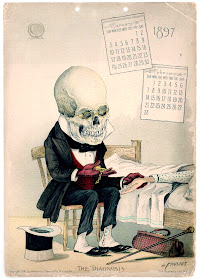
Louis Crucius (or Crusius) completed the necessary requirements to graduate as a pharmacist in 1882 and a doctor in 1890 in St Louis, Missouri. While he was studying he worked in a pharmacy and made humorous sketches that were placed in the window of the store. Although he gave most of his drawings away, Crucius sold a number of them to the Antikamnia (‘opposed to pain’) Chemical Company which had been established in St Louis in 1890. They produced antikamnia medicines containing the coal tar derivative, acetanilid, an anti-fever drug with pain relieving properties somewhat related to paracetamol, but which would be later shown to be a toxic compound not to mention addictive. Antikamnia was mixed with substances like codeine and quinine to enhance the pain relieving effects. 30 of the Crucius ‘dance of death’-inspired drawings were used to make 5 years worth of Antikamnia Chemical Company calendars - between 1897 and 1901. They had a fairly aggressive marketing campaign in which the calendars (aimed at the medical fraternity) as well as postcards and sample packs were distributed to doctors in the United States and overseas. (
Bibliodyssey)



























